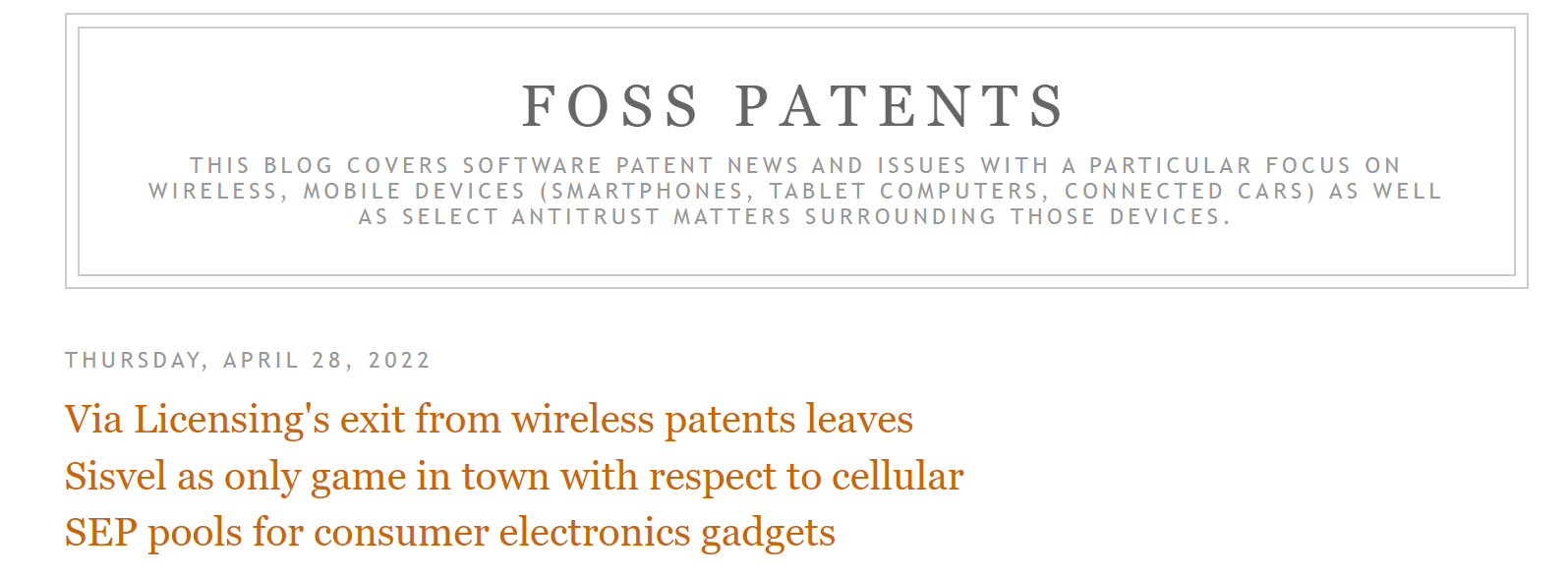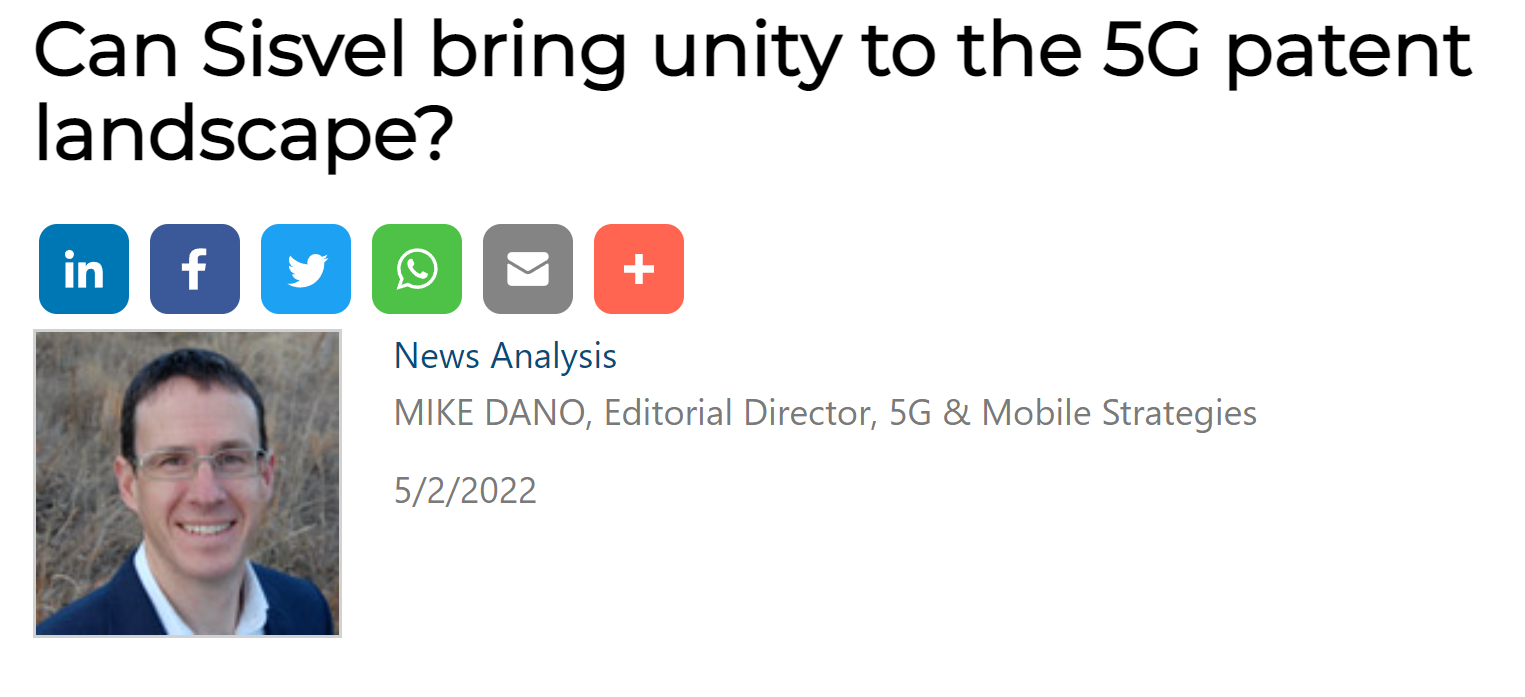Editorial response on Via exit leaving Sisvel as the only patent pool on the wireless market
On April 26, 2022, Via Licensing announced that it was dissolving certain wireless pools and would likely contribute the wireless patents owned by Via to a 5G pool under formation by Sisvel. The following day, Sisvel announced that it would attempt to convince Via pool members to join the Sisvel 5G pool and that a single pool “will create more value for licensees and accelerate adoption by 5G implementers.”
Sisvel released a Q&A with additional information describing its offering to Via pool licensors here.
Sisvel believes that the potential to create a single patent pool for 5G wireless represents a significant opportunity for both patent owners and implementors. The press and pundits agreed; here are some of the highlights of their reporting and comments.
IAM covers the management of intellectual property as a key business asset and published the first story about the announcement, available here (subscription required). Ms. Morris’ opening paragraph summarizes what happened and why it’s so significant, stating, “Via Licensing will wind down its wireless patent pool to refocus resources and energy on its AAC and MPEG-H audio codec programmes. Via’s exit leaves former competitor Sisvel as the sole wireless patent pool in the mobile devices market, and it will quickly push to attract Via’s former wireless licensors.”
Then she explains why the wireless market has been challenging for patent pools, “Patent pools in the wireless space have always struggled to pick up steam. The dynamics of the market – with so many major patent holders and device makers – make it a tough nut to crack. The biggest patent holders – Ericsson, Nokia, InterDigital, and Qualcomm – prefer in-house licensing and have never joined a pool focused on the mobile devices market.”
Regarding Sisvel's hope to consolidate the market, Ms. Morris quotes Sisvel Group President Mattia Fogliacco as “actively courting Via’s 30 licensors to join Sisvel as well.” In this regard, she explains that Sisvel will offer founding member shares to the Via patent owners and other incentives.
She also quotes Mr. Fogliacco’s comments about why the Via pool closing is so significant, “I think we have an occasion here to really aggregate a very meaningful critical mass of patent owners that then will really display those economies of scale and those transaction costs savings that are typical of patent pools or aggregators.”
The following day, Foss Patents, the blog for noted IP authority Florian Mueller, reported on the Via closing with significant commentary. Significantly, after reporting the background and facts, Mr. Mueller opined that a single pool would likely be much more successful than multiple pools.
In my observation, there is empirical evidence besides Via's codec pools that the industry benefits when it can converge on a single pool in a given field....Historically, the MPEG LA codec pools that were one-stop solutions also delivered outstanding results, while the HEVC and VVC situation is an unmitigated disaster for the industry at large.
He then shared his thoughts about “Why would or wouldn't Via's cellular SEP licensors join Sisvel's pool?” mentioning several key factors. Most significant was Sisvel’s growing reputation as a highly effective licensing administrator.
The Sisvel of now has painstakingly built a reputation of being an organization that willing and even not-so-willing licensees can get along with. A couple of weeks ago, Sisvel announced an agreement with Vivo that was struck without having to resort to litigation, which also applies to last year's deal with Samsung. Last summer, Sisvel successfully settled patent infringement disputes with Xiaomi, OPPO, and ZTE. Those are no small achievements, not only but also in light of the unit volumes involved--and Sisvel points to them in that Q&A document on the fallout from Via's decision.
He also expressed that Via’s likely endorsement would be a significant message to the Via patent owners. “By contributing the cellular patents it actually owns (as opposed to third-party patents it administered as part of the pool) to Sisvel's pool, Via endorses through meaningful action the alternative to its licensors that Sisvel's pool represents. If they issued a mere recommendation, people would wonder why they don't put their patents where their mouth is. Via's decision regarding its own patents represents meaningful peer recognition for Sisvel.”
In addition to the founding member status mentioned by IAM, Mr. Mueller further quotes the Sisvel Q&A document that details that “Sisvel will also accept existing third-party essentiality evaluations as relevant evaluations under its 5G multimode and cellular IoT pool, which should eliminate any concerns for double costs." Mr. Mueller concludes that “I would be surprised if "migration" from Via's defunct pool to Sisvel's more successful one didn't happen on a substantial scale.”
On May 2,Mike Dano from Light Reading attempted to answer the question, Can Sisvel bring unity to the 5G patent landscape? By way of background, Light Reading is an independent B2B digital media platform serving the networking and services industry.
Mr. Dano opens his article with a concise summary, “After a decade of work, Via Licensing announced it will shutter its wireless patent pool, which stretched from 3G to 5G. The move leaves Sisvel as the last big remaining patent pool in the cellular industry, just as the market's transition to 5G catches on.”
Mr. Dano quotes extensively from both IAM and Foss Patents, but provides useful original perspective regarding the makeup of the Via pool and its longstanding competition with the Sisvel pool. “Via Licensing in 2012 announced its 4G patent pool with AT&T, HP, Clearwire, Docomo, SK Telecom, Telefónica and others. Just one month later, Sisvel launched a competing pool with the likes of Orange, KPN Telecom and others, anchored by around 500 patents it acquired from Nokia.”
The article reports that “Via Licensing showed progress roughly five years ago with the addition of other participants, including Lenovo, Verizon and Conversant – after it lowered its rates,” but suggests that Sisvel’s recent licensing success might have supplied some of the impetus for Via to shutter its pool. “It's worth noting that, during the past year, Sisvel has successfully closed several cellular licensing agreements with major players like Samsung, Oppo, Xiaomi and Vivo – moves that likely put the final nails in Via's coffin.”
Regarding the Sisvel 5G pool, Mr. Dano reported, “Sisvel plans to release the details of its own 5G plans by September. The company said its 5G patent pool "hopefully" will include its existing partners alongside "many new Via patent owners that will be willing to join the pool. This pool will exclusively focus on the consumer electronics market for 2G, 3G, 4G and 5G, and will not target the automotive nor the IoT market."
Addressing Sisvel’s ability to “bring unity to the 5G patent space,” Mr. Dano shared Mr. Mueller’s quote from above, “As someone who closely monitors cellular SEP [standard-essential patent] litigation and licensing, I would be surprised if 'migration' from Via's defunct pool to Sisvel's more successful one didn't happen on a substantial scale.”
European patent publication Juve Patent published a short article on the Via closing written by Konstanze Richter. The article starts with a concise attention-grabber, “Then there was one,” and then goes recounts the basic facts already presented above.
Ms. Richter provides interesting details regarding members of the Via pool, sharing that “Via Licensing primarily holds 4G patents from around ten patent families, some of which are also applicable for 5G technology. Together with the patents of its approximately 30 licensors, including Deutsche Telekom, Google and Mitsubishi, Via Licensing says it currently has one of the largest patent portfolios for wireless technology.”
She also comments on several existing relationships between Sisvel and Via pool members, predicting that “Sisvel’s offer is likely to be particularly tempting for the existing licensors in the Via Licensing wireless pool that are also licensors in Sisvel’s pools for other technologies. This includes members of the video coding platform Dolby, or NTT Docomo.”
Other Publications
The Via announcement was also covered by multiple other IP and/or telecom resources, including:
- Via Licensing patent pool members in talks to join Sisvel 5G pool (very short summary).
- Via Licensing's exit from wireless patents leaves Sisvel as only game in town with respect to cellular SEP pools for consumer electronics gadgets (the story is the first paragraph of the Foss Patents article with a link to the article).
- Via Licensing’s exit from wireless patents leaves Sisvel as only game in town with respect to cellular SEP pools for consumer electronics gadgets (the story is the first paragraph of the Foss Patents article with a link to the article).
- Via Licensing's exit from wireless patents leaves Sisvel as only game in town with respect to cellular SEP pools for consumer electronics gadgets (the story is the first paragraph of the Foss Patents article with a link to the article).
- Via Licensing’s exit from wireless patents leaves Sisvel as only game in town with respect to cellular SEP pools for consumer electronics gadgets (the story is the first paragraph of the Foss Patents article with a link to the article).




